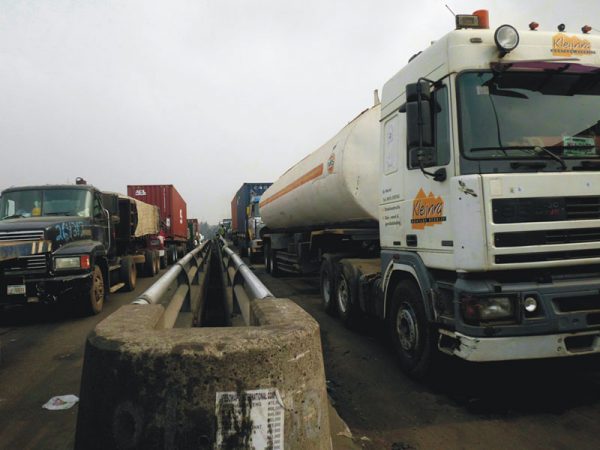Shippers’ Council Pledges To Resolve Cross-Border Trade Obstacles

- Moves to clear abandoned export containers in Lagos Ports
The Nigerian Shippers’ Council (NSC) has expressed willingness to support the International Trade Center (ITC) to resolve challenges faced by cross – border traders and facilitate trade. ITC is a co-implementer under the ECOWAS Agricultural Trade Program which aims to improve intra- regional agricultural trade at border crossing points.
Speaking during a courtesy visit to the NSC headquarters in Lagos on Friday, Associate Program Officer, ITC, Richard Eke- Metoho, who led the delegation said the visit to the Council is part of the team ongoing study to identify areas for improvement in trade facilitation, particularly at border crossing points.
He highlighted the importance of collecting data from the Nigerian Shippers’ Council, which manages a border information center at Seme-Krake border. According to him, some of the identified challenges faced by traders and truck drivers using the Seme-Krake border, a key trade route is the number of checkpoints and lack of scanners.
He said information collected by the team will not only identify existing trade facilitation measures that are working effectively but also lead to the development of new trade facilitation measures that address the challenges faced by traders.
He said, “We are here to collect experience from the Nigerian Shippers Council. “From our interactions with the Shippers Council, we keep finding similar problem faced by traders most especially on the number of checkpoints and scanners that are really needed especially for transporters and truck drivers. “It is still an ongoing study.
The more information we collect right now, the more it will help us to make more informed decision process. At the end of the study, we will be able to develop a report that will pinpoint all the main obstacles that traders are facing.” In his remarks, Executive Secretary, Nigerian Shippers’ Council, Pius Akutah emphasized that trade facilitation is a major initiative of the Council and pledged to provide the necessary support to ensure the success of the study.
He noted that the study will strengthen the Council’s ability to formalize informal trade at border areas, gather statistics, and plan for trade volumes. The focus of the study is on agricultural products, which Akutah highlighted as a significant area of potential for Nigeria, not only in the African region but also globally.
He expressed optimism that the study will help develop skills and improve operations at the Border Information Centre managed by the Council. “Trade facilition is one of the major aspect of what we do so we are going to give you the necessary support to achieve the success that is desired.
“The study will help us to plan and develop more skills in terms of what we do at the Border Information Centre. Shippers Council is a partner and I want us to take our partnership to the next level that will focus on engagement with our stakeholders, ” he said. General Manager, Operations, Nigerian Association of Road Transport Owners ( NARTO) Okafor Stephen, lamented that there are about 57 checkpoints along Mile 2 to Seme border.
This, he said has given rise to extortion by non state actors and government security officials along the Seme border road. “These are part of the things that delay movement of trucks and again lengthy clearing of cargo by customs is also part of the barrier. I hope that with this meeting, ITC and GIZ will continue to work towards surmountng this problem to ease trade, ” he said.
Meanwhile,the NSC has promised to accelerate efforts to clear 616 export containers that have been stuck in Lagos port for over two years.
Speaking during a visit to APM Terminals in Apapa port on last week, Executive Secretary of the NSC, Pius Akutah, expressed concern over the growing number of abandoned export containers due to the inability of exporters to comply with regulatory guidelines.
To address the problem, he said the Council would convene a stakeholders’ engagement, bringing together service providers, regulators, government agencies, and exporters to identify the root causes of the problem and find solutions.
He added that the Council will launch an awareness campaign to educate exporters on how to comply with export procedures, facilitating a smoother and more efficient export process.
He, however, noted that there is need to put a mechanism in place to stop export boxes that have not completed the necessary documentation from entering the port to avoid the pilling of overtime cargo.
Earlier, Government Relations Manager at APM Terminals, Kayode Daniel, said that 1,940 containers have been in Apapa port between zero and 10 days; 1,524 containers have stayed between 11 and 20 days.
He further revealed that about 757 containers have stayed between 21 and 30 days while 616 have stayed between 31 and over two years, which classified them as abandoned export containers.
He said APM Terminals has been pushing for the evacuation of the trapped export containers and had received a commitment from shipping lines including Maersk, CMA CGA and Zim to move about 2,752 export containers out of the port in the next five days.
According to him, the inability of exporters to complete the processes required for export containers to leave the port is creating operational bottlenecks for the terminal operator by way of multiple handling of export boxes.
He said exporters had been complaining that the procedure is not moving fast not knowing that it’s technically their action or inaction because Customs would not authorise the loading of an export without proper documentation. He pointed out that there is an established process that is clearly defined by government agencies, but some exporters are not complying with it strictly. Also speaking, Terminal Manager at APM Terminals, Steen Knudsen, said that technically export container is not supposed to stay within the port terminal for more than seven days because all shipping line comes to Apapa on a weekly frequency. He said the terminal operator cannot mandate the shipping line to load the container because it is an arrangement that is strictly between the exporter, Customs and the shipping line. “Most of these containers arrive at the port as ‘good to go’ but it is only when they get to the port that Customs and other authorities would discover some missing elements, which would make the shipping line not to load them,” Knudsen said. He said the service providers, Shippers Council, Customs, Nigerian Ports Authority (NPA) and other players need to work together to improve the export process in Nigerian ports.









